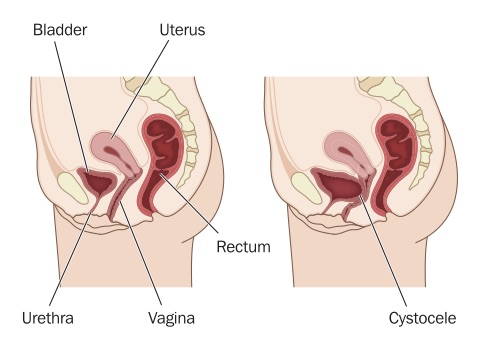Prolapse is a bulging of the pelvic organs into the vagina. The pelvic organs include your bladder, uterus (womb) and rectum (back passage). They are usually supported by a combination of supportive structures called ‘ligaments’ and ‘fascia’ within your pelvis but these can weaken, allowing the pelvic organs to drop.
Prolapse can be caused by childbirth, chronic coughing or straining (with constipation for example) or just be a byproduct of ageing. Women who have not given birth can still suffer from prolapse.
Prolapse is common, affecting almost half of women who have given birth, but often doesn’t cause problems. There is often a delay in women seeking help for prolapse.

The symptoms of prolapse include:
Prolapse can be treated in a variety of ways and the method of treatment will be tailored to your individual situation and needs.
Non surgical methods for treating prolapse include pelvic floor exercises, vaginal hormone replacement or vaginal pessaries (plastic devices worn inside the vagina that support the pelvic organs). These methods do not actually fix the prolapse but can reduce the bother that it causes. They may be a good option for those who are unfit for surgery. Your surgeon can discuss with you why they may or may not be suitable for you.
Surgical methods for repairing prolapse are based around the principles of:
There are a number of operations available for prolapse repairs. These differ based on the organ that is causing the bother, the degree of the prolapse and the patients individual medical history. These can largely be performed through the vagina but some may involve an open abdominal operation.
Perth Urology Clinics female urology doctors are urologists with subspecialty interest in the support of the bladder in prolapse. If you have a prolapse involving the womb or back passage, our urologists will consult a uro-gynaecologist to make sure you are getting the best possible care.